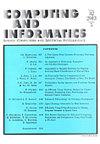New Game-Theoretic Convolutional Neural Network Applied for the Multi-Pursuer Multi-Evader Game
IF 1.7
4区 计算机科学
Q4 COMPUTER SCIENCE, ARTIFICIAL INTELLIGENCE
引用次数: 0
Abstract
. Pursuit-Evasion Game (PEG) can be defined as a set of agents known as pursuers, which cooperate with the aim forming dynamic coalitions to capture dynamic evader agents, while the evaders try to avoid this capture by moving in the environment according to specific velocities. The factor of capturing time was treated by various studies before, but remain the powerful tools used to satisfy this factor object of research. To improve the capturing time factor we proposed in this work a novel online decentralized coalition formation algorithm equipped with Convolutional Neural Network (CNN) and based on the Iterated Elimination of Dominated Strategies (IEDS). The coalition is formed such that the pursuer should learn at each iteration the approximator formation achieving the capture in the shortest time. The pursuer’s learning process depends on the features extracted by CNN at each iteration. The proposed supervised technique is compared through simulation, with the IEDS algorithm, AGR algorithm. Simulation results show that the proposed learning technique outperform the IEDS algorithm and the AGR algorithm with respect to the learning time which represents an important factor in a chasing game.新型博弈论卷积神经网络在多追踪者多逃避者博弈中的应用
. 追赶-逃避博弈(PEG)可以定义为一组被称为追赶者的智能体,它们与目标合作形成动态联盟来捕获动态逃避者,而逃避者则根据特定的速度在环境中移动以避免被捕获。捕获时间这一因素在以前的各种研究中都有涉及,但仍然是满足这一因素研究对象的有力工具。为了提高捕获时间因子,本文提出了一种基于卷积神经网络(CNN)和劣势策略迭代消除(IEDS)的在线分散联盟形成算法。该联盟的形成使得追踪者在每次迭代中学习在最短时间内捕获的逼近器编队。跟踪器的学习过程取决于CNN在每次迭代中提取的特征。通过仿真,将提出的监督算法与IEDS算法、AGR算法进行了比较。仿真结果表明,所提学习方法在学习时间方面优于IEDS算法和AGR算法,而学习时间是追逐博弈中的一个重要因素。
本文章由计算机程序翻译,如有差异,请以英文原文为准。
求助全文
约1分钟内获得全文
求助全文
来源期刊

Computing and Informatics
工程技术-计算机:人工智能
CiteScore
1.60
自引率
14.30%
发文量
19
审稿时长
9 months
期刊介绍:
Main Journal Topics:
COMPUTER ARCHITECTURES AND NETWORKING
PARALLEL AND DISTRIBUTED COMPUTING
THEORETICAL FOUNDATIONS
SOFTWARE ENGINEERING
KNOWLEDGE AND INFORMATION ENGINEERING
Apart from the main topics given above, the Editorial Board welcomes papers from other areas of computing and informatics.
 求助内容:
求助内容: 应助结果提醒方式:
应助结果提醒方式:


